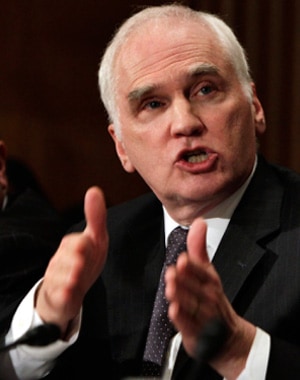MILESTONES: US/GLOBAL
By Gordon Platt
The US Federal Reserve wants foreign banks with large operations in the US to be subject to the same rules on capital and liquidity that apply to big US banks.
 |
|
Tarullo wants foreign banks with US operations to play by US rules Photo Credits: TARULLO: REUTERS/YURI GRIPAS |
Daniel Tarullo, a member of the Federal Reserve Board of Governors, says the Fed will issue new rules on foreign banks that will include stress tests and exposure limits.
The Fed wants to limit the risks that big banks, be they foreign or domestic, could pose to the US financial system. In a speech at the Brookings Institution in December, Tarullo said tougher capital requirements would make it less likely that US taxpayers would be left holding the bag when too-big-to-fail banks fail.
The Dodd-Frank Act closed a loophole that enabled the US operations of foreign banks to hold less capital than large US banks. Some foreign banks responded by creating bank holding companies for their US operations that were not subject to Dodd-Frank capital requirements. Tarullo said the Fed’s new rules would no longer enable foreign banks to escape US regulatory requirements.
Charles Dallara, outgoing managing director of the Institute of International Finance (IIF), says: “We need to study the Fed’s proposals. I am concerned about growing signs of fragmentation in the financial markets, which took decades to build. My understanding was that regulations would be introduced on a global basis with standards.” Dallara was the chief negotiator for the private-sector institutions involved in Greece’s sovereign debt restructuring. The IIF represents more than 450 financial institutions from around the world. In December, Dallara was replaced at the IIF by Tim Adams, managing director of Washington, DC–based economic advisory firm The Lindsey Group.
In a statement following IIF’s November 29 meeting welcoming the refinancing of Greece’s sovereign debt, Dallara stated: “It is important to sustain the momentum on the ambitious plan for a single supervisory mechanism (SSM) for euro area banks. Otherwise, direct bank recapitalization could be delayed, putting recent bond stability at risk.” The group says that de-linking sovereign and banking risk would lessen the risk of fragmentation of financial markets. Spreads on sovereign debt have eased, but the somewhat more stable conditions are unlikely to persist, adds Dallara.



